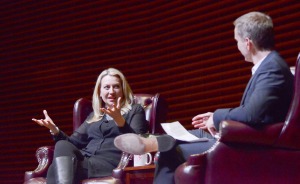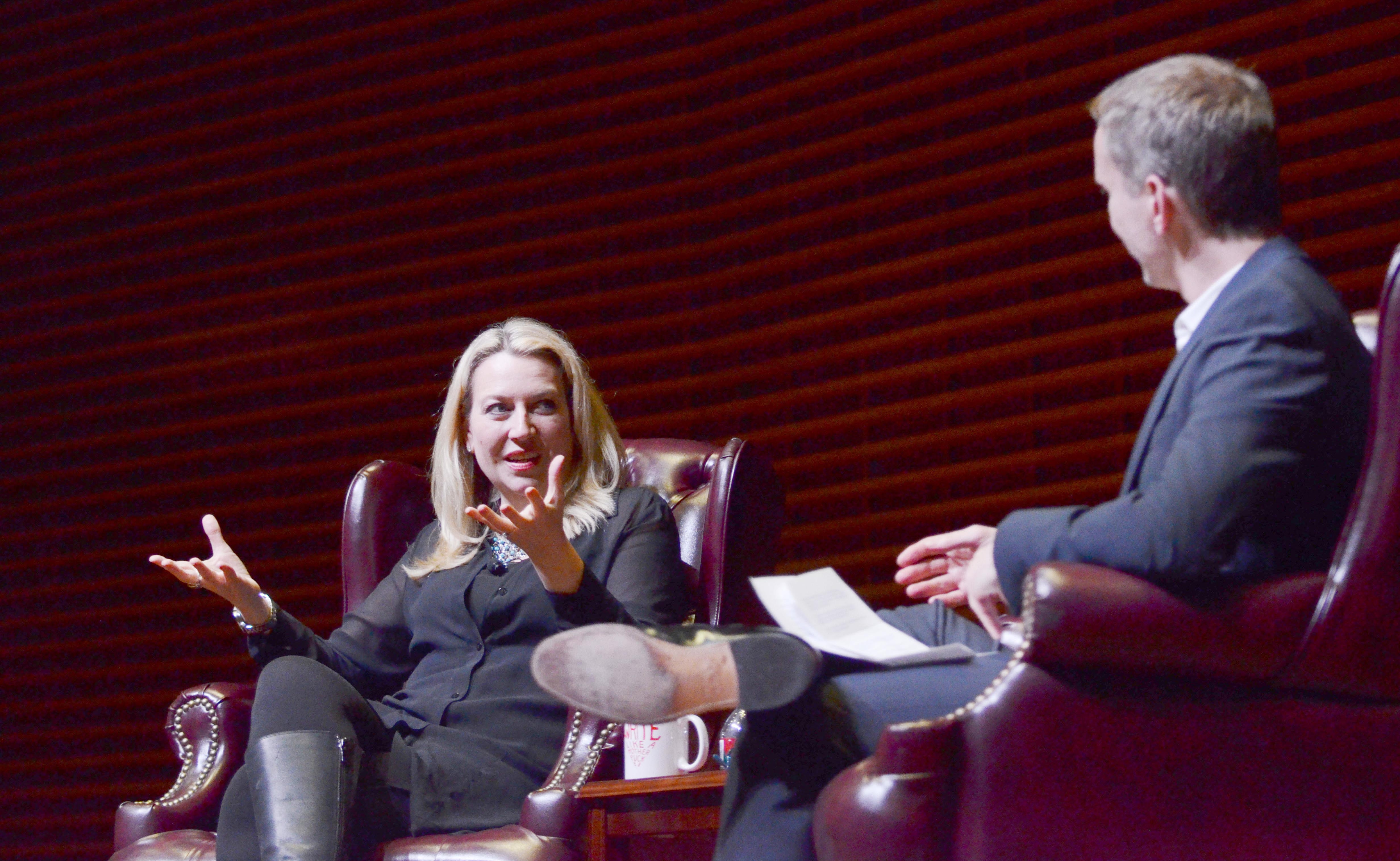
Arriving 45 minutes early to hear Cheryl Strayed, author of the best selling memoir “Wild” that was made into an award-winning movie last month, give a talk Tuesday night at Cemex Auditorium seemed like a safe bet to Maddie Saviano ’18. After an hour of waiting in a line of over a thousand people, however, Saviano was turned away along with hundreds Stanford students who had been promised preferred seating.
“I’m paying tens of thousands of dollars a year to hear speakers like Cheryl Strayed,” Saviano said, frustrated by the lack of accommodation of an event that had been widely publicized around campus. “These events should actually be accessible to undergraduates.”
The 600 people that were able to go inside and attend were able to hear Strayed’s two hour discussion on her writing technique, personal anecdotes from her life, as well as jokes that sent the entire audience into laughter.
Strayed talked mostly about her novel, “Wild,” which chronicled her 1,100 mile journey of the Pacific Coast Trail in 1995 taken by Strayed, age 26 at the time, after her mother had passed away and her marriage had disintegrated.
“So many people felt that Wild was a book about them,” Strayed said of the many fans who have spoken and written to her about how similar their stories are of grief and coping with such traumatic experiences.
“It is about you,” she assured the audience.
Strayed spoke of writing technique at several points throughout her talk and joked to the audience multiple times that she was going to lock the doors and have a writing workshop all night long.
“Write about the objects that mean something to you,” Strayed suggested of writers that were in a rut. She explained the idea of a “talisman,” which to her was a jar of rocks she found when cleaning out her mother’s belongings. The rocks had been gifts from herself and her siblings to her mother and had been kept all those years.
Jennifer Finley, a Santa Clara resident who asked Strayed a question during the question-and-answer session at the end, was thrilled to get to hear Strayed talk in person.
“I read the book a couple of years ago and really loved it,” Finley said. “I tried to get everyone I knew to read the book.”
When the movie came out on Dec. 5 last year, Finley gathered an entire group of women to attend the screening and went a second time a few weeks later.
“I don’t have big enough words to say how happy I am to see and hear Cheryl in person,” Finley smiled, “She’s every bit as wonderful in real life and I’m immensely grateful to whoever coordinated her coming.”
Anna Wietelmann ’16 was glad to have been one of the few Stanford students who pushed their way in at the last minute, after standing in line for over an hour. Wietelmann had read “Wild” and enjoyed the movie as well. She was frustrated that so few undergraduates were allowed into the talk but said that the variety of ages in the audience was part of what made the talk so fascinating.
“It was interesting to think about what each member got out of what Strayed said,” Wietelmann commented, saying that as a younger member of the audience she doesn’t know the same grief as some of the older generations present.
Seeing Strayed speak in person was very different than what Wietelmann had imagined. Wietelmann, an outdoor enthusiast herself expected Strayed to be more outdoorsy. “But she’s not,” Wietlemann said, “And that’s kind of the point.”
Kira Minehart ’16 had also read and watched “Wild” and appreciated Strayed’s remarks about how to write such a personal story with courage.
“Her writing is very true,” Minehart explained, “I saw today that she is a brave person, and not just behind her pen.”
Courage is a theme that surfaced throughout Strayed’s talk and indeed in her books as well.
Finely herself carries a handwritten quote from “Wild” with her in a small notebook everywhere she goes: “I knew that if I allowed fear to overtake me, my journey was doomed. Fear, to a great extent, is born of a story we tell ourselves, and so I chose to tell myself a different story from the one women are told. I decided I was safe. I was strong. I was brave.”
Contact Elizabeth Wallace at wallacee ‘at’ stanford.edu.
